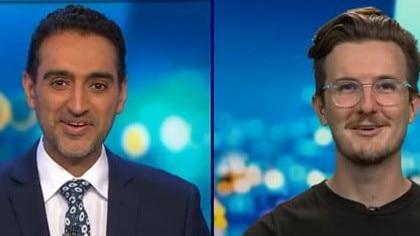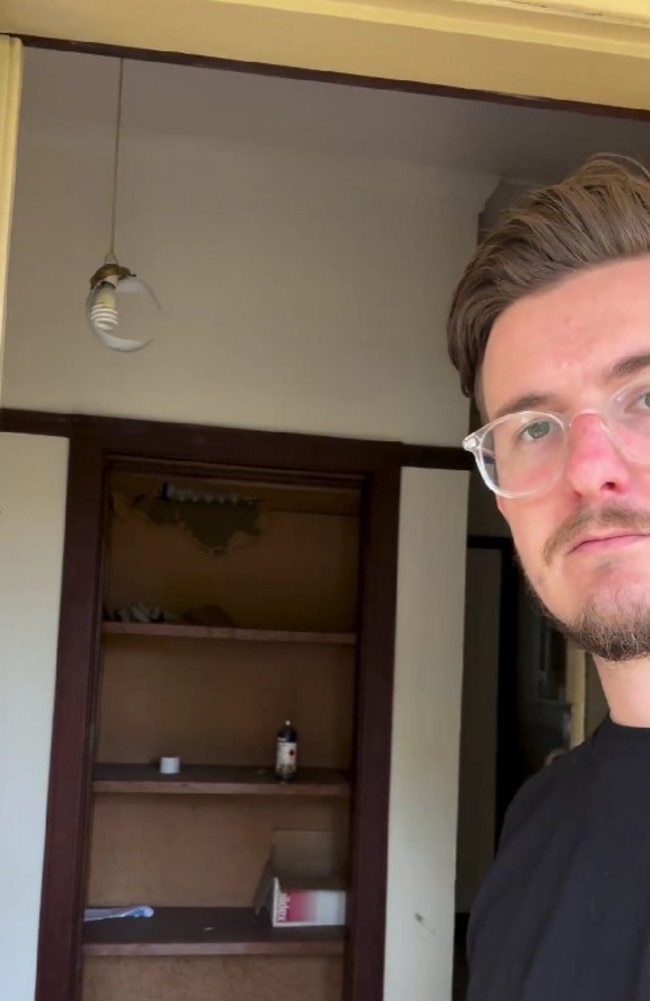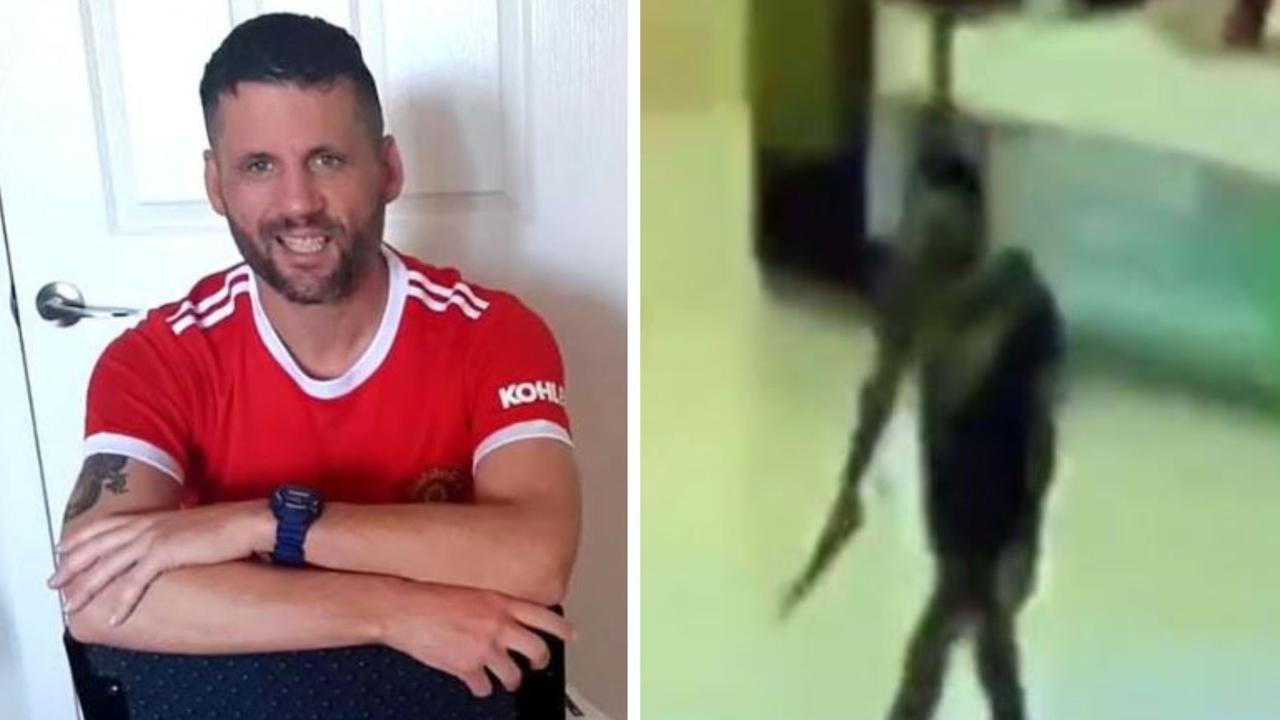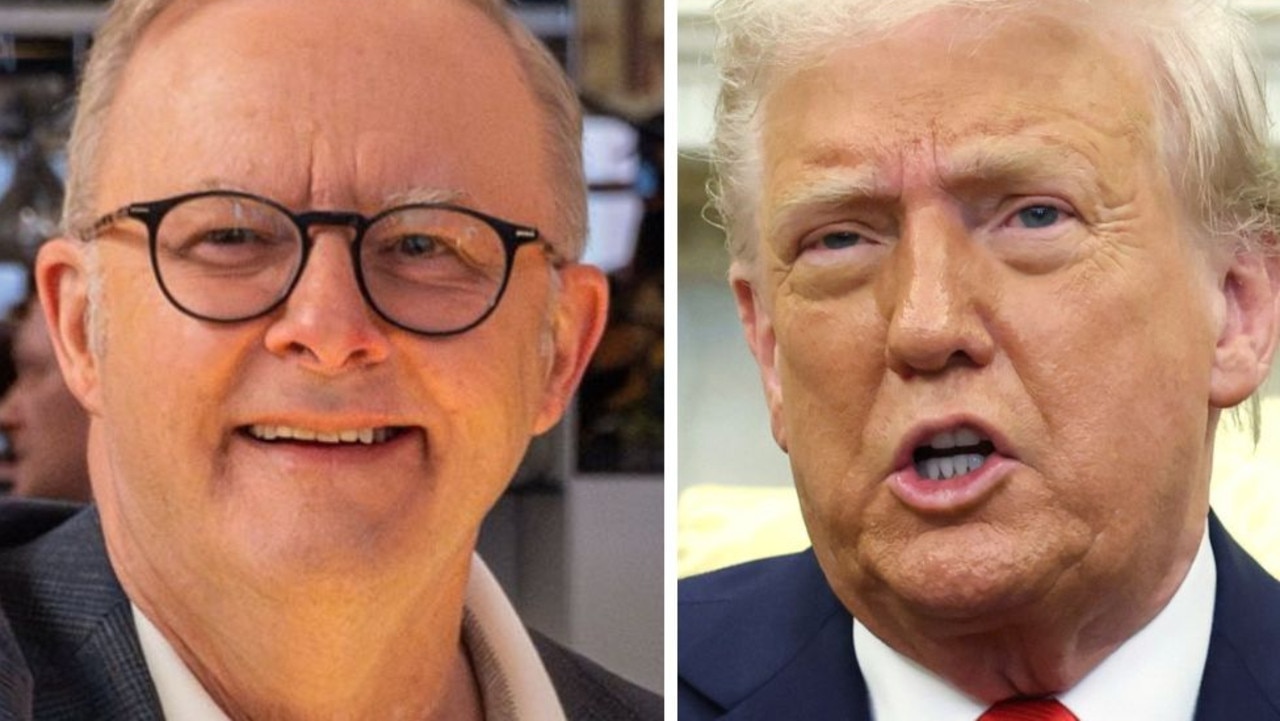‘Free house’: Renter advocate and social media star encourages struggling Aussies to become squatters
The Project panel has split opinion online after grilling a rental advocate for encouraging struggling Aussies to squat in vacant homes.

News
Don't miss out on the headlines from News. Followed categories will be added to My News.
Social media users have taken aim at stars of The Project after an appearance by a renter advocate who’s encouraging those struggling with the housing crisis to squat in empty homes.
Jordan van den Berg, better known online as @purplepingers and founder of the S*** Rentals website, shared a video to his channels at the weekend as something of a call to arms.
“Are you sick of rich people hoarding empty houses during a housing crisis? I know I am,” Mr van den Berg said, standing outside a rundown house in the Melbourne suburb of Chadstone. “Here’s how you can do something about it.”
Mr van den Berg announced he’s started collecting user submissions about empty homes in their suburbs via a form on his website, which he plans to then promote on social media, in which those who can’t put a roof over their heads could squat in.
His campaign has caught the attention of the media and Mr van den Berg appeared on The Project on Monday night to talk about his controversial plans.
Do you have a story? Email tips@news.com.au


The interview has been branded by many on social media as “out of touch” and “unbelievable”.
‘They don’t get it’
Mr van den Berg was grilled on his video and whether the encouragement of people to become squatters was a sensible solution to the rental crisis.
“I know we’re in a pretty serious housing crisis, but do you really think encouraging people to squat in private properties is the way to fix it?” co-host Sarah Harris asked.
Mr van den Berg said: “Let me answer your question by asking you a question. Do you think it’s right we have thousands of vacant, abandoned homes while we have people living on the street?”
Harris said she didn’t, but asked whether the solving the housing crisis should be focused on policy instead.

Later in the interview, panellist Steve Price wasn’t convinced there were that many vacant properties going, but Mr van den Berg pointed out he’d received more than 300 submissions from Aussies about empty houses in their suburbs.
And he revealed he’s aware that desperate people are actually squatting in abandoned properties.
“If someone needs a house, they can reach out to me and I’ll send them [details about] an empty home,” he said.

Harris expressed shock that people would “basically camp out in abandoned houses with no power” but Mr van den Berg said “camping out inside” was likely better than sleeping on the streets or in a park.
Co-host Waleed Aly pushed Mr van den Berg on whether he was encouraging people to break the law, but he pointed out that squatting – done properly – isn’t technically illegal.
Writer and comedian John Delmenico took to X, formerly Twitter, to say: “Watching the rich out-of-touch panel on the Project realise in real time that not everyone is rich is so bizarre. Especially the part where Pingers has to explain that being in a house is safer than sleeping on the street. How do they host the news with no connection to reality?”
Others agreed, poking fun at the panellists’ shock that “shelter without electricity is better than no shelter with no electricity”.

One wrote: “She was laughing at the fact that ppl would camp out in abandoned houses with no power/water, until he put her in her place by reminding her they’re better off camping under shelter than outside. Mic drop moment.”
Another added: “Homelessness exists … it’s quite a big problem actually.”

Others agreed with The Project stars’ concerns, with one X user writing in support: “Encouraging people to squat, who does he think he is?”
Another wrote: “Unbelievable this guy is actually a lawyer.”
And another comment read: “He thinks he’s doing a good thing, but he’s given absolutely no critical thought to the implications of encouraging people to take over ‘empty homes’.”
The controversial video
In his original video at the weekend, Mr van den Berg took aim at the “thousands” of property owners who are deliberately leaving their homes vacant.
“If you live in a suburb where a rich person has an empty home and is just land-banking it and waiting for that house to increase in value before they sell it, while we have probably the fastest rate of homelessness increasing in Australia, let me know about it. I’ll go through them.
“If you need a house, I’ll keep letting you know where some are for you to live in. Just remember though, if you do change the locks, make sure to keep the old ones because otherwise you can be charged with theft.
“Theft is a crime. Adverse possession? Not necessarily. Just remember to not break any windows or anything and generally speaking, it’s not great to break into a house, but if the front door’s just wide open …”

Mr van den Berg declared: “Homes are for people to live in, not for rich people to make money off.”
A country in crisis
Aussie renters have been hammered by steep price increases over the past few years, while rising demand and dwindling supply have sparked intense competition.
According to CoreLogic, rental growth has averaged 9.1 per cent per year for the past three years, in stark contrast to the average rate of annual growth of 2 per cent during the 2010s.
A survey conducted by the Tenants Union of New South Wales found 82.5 per cent of renters have been subjected to a recent increase in their housing costs.
As a result, 84 per cent had been forced to cut back on discretionary spending and other costs.
And research by advocacy group Everybody’s Home found almost half of Aussies are in a state of housing stress, spending 30 per cent of their income or more on housing. Young people aged 18 to 34 have it toughest, with half of the cohort spending 40 per cent of more.

The current rental vacancy rate – that is, the proportion of all leased dwellings available on the market – is just one per cent at a national level, while in Sydney it’s 1.1 per cent, in Melbourne it’s one per cent, and in Brisbane it’s 0.9 per cent, SQM Research data shows.
Economists generally view a vacancy rate of less than two per cent to be a sign of a rental market in crisis.
At the same time, data from the 2021 Census showed 10 per cent of all residential dwellings were unoccupied on the night the national survey was conducted.
That equates to more than 1.04 million empty properties – many of which experts say might otherwise be available to tenants or homebuyers.
Landlords are ‘land-banking’ homes
In his video, Mr van den Berg visits an empty house in Chadstone, which he explains had been a long-term rental.
The landlord raised the rent, and the previous tenants couldn’t afford to cop the financial hit, so they left, he explained.
“Ever since then, this house has been empty,” he said.
It’s understood the owner of the property had submitted a development application on the site but was unsuccessful in obtaining approval.


The house is in a bad state – it even featured on his Sh** Rentals website when tenanted – with its front windows smashed and rubbish strewn throughout, while the fence has fallen over.
“I feel like I may not be the first person to come and visit this house,” Mr van den Berg said.
“Fun fact – squatting in Australia is not necessarily illegal, which is the best type of legal, especially if the front door doesn’t actually lock.”
The front door of the Chadstone home was indeed unlocked, prompting him to declare: “So yeah, here’s a free house if you want it.”
Leo Patterson Ross, chief executive of the Tenants Union of NSW, said Mr van den Berg was “drawing attention to issues that government should be acting on”.
“In the middle of a housing crisis with growing levels of homelessness, we should be looking to ensure homes are not left vacant,” Mr Patterson Ross said.

Squatting is in something of a legal grey area in Australia, but broadly speaking, ‘adverse occupant’ or squatters’ rights do exist, meaning someone who has possessed a dwelling or land for at least 12 years could claim legal ownership.
However, if they were forced to break into the property by smashing a window, picking a lock or breaking down a door, their actions would likely be considered illegal.
“Squatting laws in Australia operate on a reasonable ‘use it or lose it’ basis,” Mr Patterson Ross said.
“If a person leaves a property unattended and empty for 12 years, then I think many of us would agree it seems fair that the community can reclaim usage to provide a home, whether that be individuals or government.”

In 2018, a property developer won a court battle to obtain legal ownership of a Sydney house said to be worth about $1.6 million, after finding it empty in 1998.
Bill Gertos was visiting a client on the Ashbury street when he came across the home and noticed its back door was unlocked. Mr Gertos took ‘possession’, made repairs and renovations, changed the locks and rented out the property for two decades.
After his court win, he sold the home in 2020 for $1.4 million.
Furious reaction to video
Mr van den Berg’s video has attracted some criticism, even gaining the attention of an American far-right news website and conservative social media commentators.
Fringe website The Publica labelled him a “far-left ‘anti-landlord’ activist”, prompting a barrage of angry messages on X, formerly Twitter.
Following the backlash, Mr van den Berg said he’d added an option to the form for people in the United States to submit details of empty homes in their country.

Locally, Real Estate Buyers Agents Association of Australia president Melinda Jennison expressed concerned about Mr van den Berg’s approach.
“While addressing vacant properties is a valid concern, publicly identifying their addresses and promoting squatting sets a dangerous precedent,” Ms Jennison said.
“It not only undermines property rights but also poses significant legal and safety risks for both property owners and potential squatters.”
She urged “a more constructive approach” to addressing the housing crisis that respected legal frameworks “and encourages dialogue”.
Nicola McDougall, chairwoman of industry group Property Investment Professionals of Australia, said she was dismayed by the video.
“What determines whether a property is empty, in his lofty opinion? “Because it has an overgrown lawn and no furniture?” Ms McDougall said.
“There is a plethora of reasons why a home might be vacant – including it has been sold or leased but the new owners or renters simply haven’t moved in yet.”
A spokesperson for the Real Estate Institute of Australia said squatting should not be “openly encouraged by activists to vulnerable Australians”.
“If this energy was directed to our MPs and Senators, maybe there would be sufficient funding and resources to resolve public housing waitlists,” the spokesperson said.
‘No one’s doing anything’
Speaking to news.com.au, Mr van den Berg said he wanted to achieve three things with the controversial video.
“The number one motivation for it was to house people who need housing,” he said, reiterating his view that people in need of a home should squat in a vacant one.
“Number two was to prompt the government to act, to say that if they’re not going to do anything about land-banking, we can make them.
“People are struggling, and they have been struggling for a while, and it’s not getting better. It’s getting far worse. The government isn’t doing anything about it at the end of the day.
“And number three was to remind landlords that it is unethical to have a home sit empty during a housing crisis.”

In just two days, he has received about 260 submissions about empty homes across the country, showing there are “so many out there”.
Aside from the furious reaction from many Americans, including a number of death threats, Mr van den Berg said his Aussie followers had been more constructive with their feedback.
“I’ve had a lot of mixed reactions and a lot of people debating,” he said.
“Most people agree that it is unethical that we have abandoned houses while we also have homeless people in Australia but the area that they disagree on is whether this is the right way to solve that problem.”
And his response to real estate commentators attacking him was: “Squatting is legal. Feel free to change the law if you’d like.”
One-in-10 homes sitting empty
Following the release of Census data on vacant properties, the Australian Housing and Urban Research Institute released analysis about the “reality” of empty dwellings.
These include homes being renovated, properties sold with vacant possession, rentals awaiting new tenants, people living away temporarily, deceased estates, homes deemed unliveable, assets subject to a probate application or other legal proceedings, and those whose owners are overseas.
However, it conceded that land banking – where a house is kept vacant while an owner waits for it to increase in value – is another factor.
“The proportion of unoccupied houses varies significantly across the country and is much higher outside of Australia’s state and territory capital cities,” the AHURI paper said.
“The reasons for this can include dwellings on rural properties where owners have moved into local towns (particularly as owners age), regional and rural areas which have experienced population decline, and areas where people have a beach or rural retreat house that will only be occupied for short periods of the year.”

Angus Moore, an economist with PropTrack, said the number of unoccupied dwellings on Census night in 2021 was stark.
“Empty homes were more common in regional areas than in capital cities,” Mr Moore said.
“While we can’t know why a home is vacant, this difference is consistent with some people having unoccupied second or holiday homes regional areas.”
“Across the capitals, Canberra (6.6 per cent) and Brisbane (6.8 per cent) had the lowest share of their homes unoccupied on Census night. Melbourne, which was in lockdown at the time, was highest at 10 per cent.”
But even the Victorian capital still had fewer vacant homes than all regional areas, he pointed out.
Governments cracking down
The issue of vacant properties at a time when rental supply is so constrained is something governments are beginning to examine.
In Victoria, parliament passed changes to land tax provisions in December to allow higher levies to be imposed on vacant homes and unimproved residential land that’s sat untouched for more than five years in developed parts of Melbourne.
Assistant Treasurer Danny Pearson said at the time the changes would “make more properties available for people to live in”.
Victorian Greens MP Sam Hibbins said it was “abhorrent” to have thousands of homes sitting empty when so many are struggling to put a roof over their heads.
“The purpose of this tax is not to collect revenue but actually to push empty homes onto the market for renters and for people who are in need of their first home,” Mr Hibbins told the parliament.

Following the decision south of the border, NSW Premier Chris Minns said he wouldn’t be following suit with a similar vacant dwelling tax.
However, the state government is conducting a review on short-term rentals like Airbnbs and Housing Minister Rose Jackson said every option was on the table.
In mid-2022, the Queensland Government backflipped on plans to overhaul how land tax is applied to property investors in the state.
It had proposed calculating the levy based on an investor’s entire holdings, including homes owned outside the state, sparking a concerted campaign from property industry forces.
‘Us and them’ narrative
Since sharing his video, Mr van den Berg has received plenty of support for the initiative from his mammoth fan base online.
“There are mothers and their children living in tents, and then we have s*** like this!” one said of the vacant house he filmed.
“This is my new favourite thing on the internet,” another said.
One wrote: “Someone could be living there and loving that beautiful front and backyard.”
A commenter said there were “easily about 100” vacant properties in their town while another said a brand-new home completed two years ago in their Melbourne suburb had sat empty the entire time.
“All that these types of guerrilla tactics do is further cement the growing ‘us and them’ narrative between property owners and tenants from the far left, which will worsen the housing crisis and push rents even higher,” Ms McDougall warned.
“Fundamentally, extreme views like this, as well as policies like rent freezes, make the situation much tougher for tenants – and especially for any who think squatting in someone else’s legal property is suddenly a solid idea.”

Ray White chief economist Nerida Conisbee said “most rental housing” in Australia is provided by private investors.
As more people rent – and for longer – and the population grows sharply, the country needs more diversity in terms of who provides leased dwellings.
“While it is unlikely that Government will be able to step in – government-owned rental properties have been declining for decades – institutional ownership of rental properties will be the growth area,” Ms Conisbee said.
In particular, build-to-rent properties developed and held by major institutions, including superannuation funds, are a tiny proportion of the market at the moment but should be considered for growth, she said.
Originally published as ‘Free house’: Renter advocate and social media star encourages struggling Aussies to become squatters




